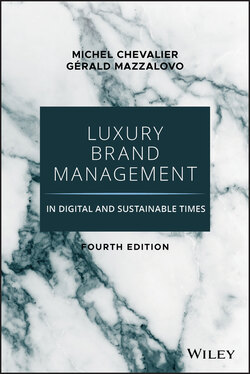Читать книгу Luxury Brand Management in Digital and Sustainable Times - Michel Chevalier - Страница 16
Etymology and Transformations
ОглавлениеThe word luxury comes from the Latin luxus, which means “grow askew, excess.” Its root is an old Indo-European word that meant “twist.” In the same family, we find “luxuriant” (yielding abundantly) and “luxation” (dislocation). In short, the term originally refers to something of the order of aberration: it is almost devoid of any positive connotation.
We have used the dictionary Le trésor de la langue française informatisé, which offers a brief overview of two centuries of use.
1607: “way of life characterized by large expenditures to make shows of elegance and refinement”
1661: “character of which is expensive, refined,” luxury clothing
1797: “expensive and superfluous object, pleasure”
1801: “excessive quantity,” a luxury of vegetation
1802: “which is superfluous, unnecessary”
Little by little, the notion of guilty excess disappears, while the ideas of distinction and refinement gain in strength. In the Classical Age, luxury is already full of ambiguities: speaking of women's toilette, La Fontaine relates the “instruments of luxury” to everything “which contributes not only to cleanness, but also to delicateness.” This does not prevent him from condemning, moralistically, “these women who have found the secret to become old at twenty years, and seem young at sixty.”3 Around the same time, the grammarian Pierre Nicole wishes that “great people,” by their example, deter us from “luxury, blasphemy, debauchery, gambling, libertinage.”4 In sum, the luxury already connotes sophistication, but it remains morally suspect.
At the dawn of the Industrial Revolution, the connotation of superfluous—which is not motivated by economic and utilitarian logic—begins consolidating. It becomes more nuanced with the advent of mass consumption and the civilization of leisure. The superfluous is not debauchery; it is beyond the commercial sphere, but it can also mark the promotion of a certain quality of life.
As for the price dimension, it appears very early and remains virtually unchanged over the years: luxury is something that is to be paid for.
From the same French dictionary, we see that current usages of the word “luxury” show evolutionary meanings: the original meanings are enriched by others, introducing the word into the sphere of day-to-day experience (“little luxuries”) while affirming the notion of a pleasure without complex (“innocent luxury”):
1 Social practice characterized by lavish expenditures, the search for expensive amenities or refined and superfluous goods, often motivated by a taste and desire for the ostentatious and fatuous.
2 Luxury (as an adjective). Of very high quality, sophisticated and expensive. Article, object, luxury product, grand luxury, semi-luxury, luxury style, luxury animal.
3 Refers to a thing, a behavior valuable because of the enjoyment it provides. “The toothbrush still plays me tricks and also the tube of toothpaste that always breaks from the bottom. One must sacrifice these small luxuries to the great luxury of time” (Paul Morand).5
4 Qualify a thing, a behavior valuable because of its rarity and sometimes by the fact that it is devoid of utilitarian function. “The emerging forms of society today are not making the existence of intellectual luxury one of their essential conditions. Probably, the unnecessary cannot nor should interest them” (Paul Valéry).6
The adventures of the word reflect those of the concept. It shows that luxury emerged first as a licit experience—a practice of distinction—and then, when everyone wanted to distinguish himself from everyone, as a common experience. From the etymology of excess or botanical deviation, the meaning extends into excessive or unnecessary, redundant, expensive objects. The previous senses are still present, but they evolve to include scarcity. Soon the meaning attached to the valuable, rare, and expensive object will apply to the lifestyles of their owners and mean wealth, ostentation, and, therefore, power.
With the emergence of the postmodern brand—that is, the appearance of brands communicating in the registry of luxury by offering imaginary worlds associated with luxurious lifestyles, without necessarily offering expensive and certainly not rare objects—new meanings emerge and are superimposed on the previous ones.
The aesthetic treatment of objects, design, and creativity become more relevant. At the social level, luxury gathers additional values of seduction and elitism, not foreign to the values of power and prestige. Hedonism becomes the latest addition to the valences of luxury, a characteristic of our times of postmodern consumerism.
